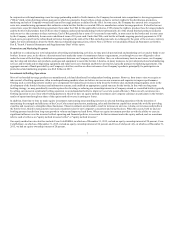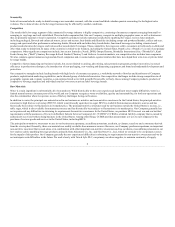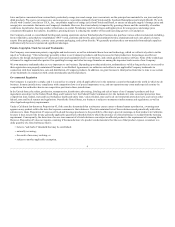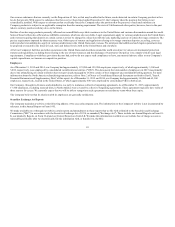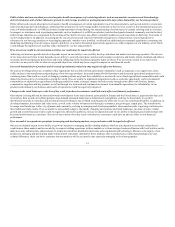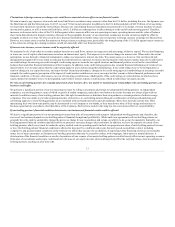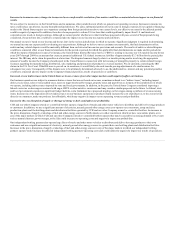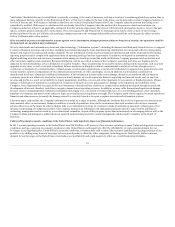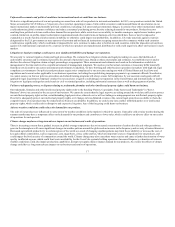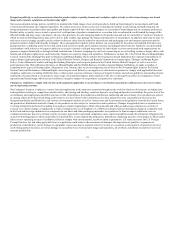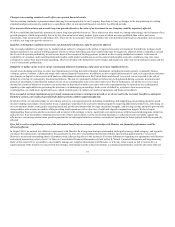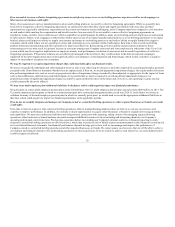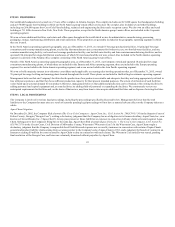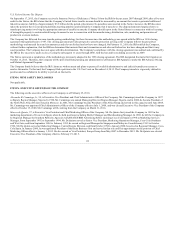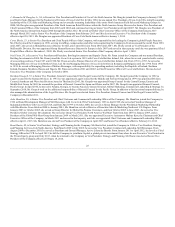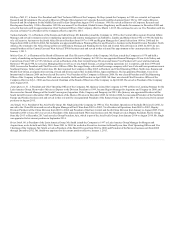Coca Cola 2015 Annual Report Download - page 19
Download and view the complete annual report
Please find page 19 of the 2015 Coca Cola annual report below. You can navigate through the pages in the report by either clicking on the pages listed below, or by using the keyword search tool below to find specific information within the annual report.
Unfavorable economic and political conditions in international markets could hurt our business.
We derive a significant portion of our net operating revenues from sales of our products in international markets. In 2015, our operations outside the United
States accounted for $23.9 billion, or 54 percent, of our total net operating revenues. Unfavorable economic conditions and financial uncertainties in our
major international markets and unstable political conditions, including civil unrest and governmental changes, in certain of our other international markets
could undermine global consumer confidence and reduce consumers' purchasing power, thereby reducing demand for our products. Product boycotts
resulting from political activism could reduce demand for our products, while restrictions on our ability to transfer earnings or capital across borders, price
controls, limitation on profits, import authorization requirements and other restrictions on business activities which have been or may be imposed or
expanded as a result of political and economic instability or otherwise could impact our profitability. In addition, U.S. trade sanctions against countries
designated by the U.S. government as state sponsors of terrorism and/or financial institutions accepting transactions for commerce within such countries
could increase significantly, which could make it impossible for us to continue to make sales to bottlers in such countries, while the imposition of sanctions
against U.S. multinational corporations by countries in which our products are manufactured, distributed or sold could negatively affect our business in such
markets.
Litigation or legal proceedings could expose us to significant liabilities and damage our reputation.
We are party to various litigation claims and legal proceedings. We evaluate these litigation claims and legal proceedings to assess the likelihood of
unfavorable outcomes and to estimate, if possible, the amount of potential losses. Based on these assessments and estimates, we establish reserves and/or
disclose the relevant litigation claims or legal proceedings, as appropriate. These assessments and estimates are based on the information available to
management at the time and involve a significant amount of management judgment. We caution you that actual outcomes or losses may differ materially
from those envisioned by our current assessments and estimates. In addition, we have bottling and other business operations in markets with high-risk legal
compliance environments. Our policies and procedures require strict compliance by our associates and agents with all United States and local laws and
regulations and consent orders applicable to our business operations, including those prohibiting improper payments to government officials. Nonetheless,
we cannot assure you that our policies, procedures and related training programs will always ensure full compliance by our associates and agents with all
applicable legal requirements. Improper conduct by our associates or agents could damage our reputation in the United States and internationally or lead to
litigation or legal proceedings that could result in civil or criminal penalties, including substantial monetary fines as well as disgorgement of profits.
Failure to adequately protect, or disputes relating to, trademarks, formulae and other intellectual property rights could harm our business.
Our trademarks, formulae and other intellectual property rights (refer to the heading "Patents, Copyrights, Trade Secrets and Trademarks" in "Item 1.
Business" above) are essential to the success of our business. We cannot be certain that the legal steps we are taking around the world are sufficient to protect
our intellectual property rights or that, notwithstanding legal protection, others do not or will not infringe or misappropriate our intellectual property rights.
If we fail to adequately protect our intellectual property rights, or if changes in laws diminish or remove the current legal protections available to them, the
competitiveness of our products may be eroded and our business could suffer. In addition, we could come into conflict with third parties over intellectual
property rights, which could result in disruptive and expensive litigation. Any of the foregoing could harm our business.
Adverse weather conditions could reduce the demand for our products.
The sales of our products are influenced to some extent by weather conditions in the markets in which we operate. Unusually cold or rainy weather during the
summer months may have a temporary effect on the demand for our products and contribute to lower sales, which could have an adverse effect on our results
of operations for such periods.
Climate change may have a long-term adverse impact on our business and results of operations.
There is increasing concern that a gradual increase in global average temperatures due to increased concentration of carbon dioxide and other greenhouse
gases in the atmosphere will cause significant changes in weather patterns around the globe and an increase in the frequency and severity of natural disasters.
Decreased agricultural productivity in certain regions of the world as a result of changing weather patterns may limit the availability or increase the cost of
key agricultural commodities, such as sugarcane, corn, sugar beets, citrus, coffee and tea, which are important sources of ingredients for our products, and
could impact the food security of communities around the world. Climate change may also exacerbate water scarcity and cause a further deterioration of water
quality in affected regions, which could limit water availability for the Coca-Cola system's bottling operations. Increased frequency or duration of extreme
weather conditions could also impair production capabilities, disrupt our supply chain or impact demand for our products. As a result, the effects of climate
change could have a long-term adverse impact on our business and results of operations.
17


